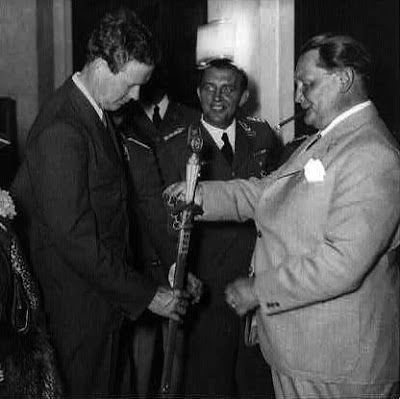From the July 21, 1940 edition of The Massachusetts Spy:
[Editors Note: The Spy is pleased and honored to present, for the edification of you, the humble reader, the powerfully reasoned words of American hero and influential commentator on the international situation Col. Charles A. Lindbergh, whose views at this critical hour should be of interest to every patriotic American. Tomorrow, the Spy will present the similar sentiments expressed by that great son of the Commonwealth, Ambassador Joseph P. Kennedy.]
Where I Stand:
WITH FRANCE DEFEATED, U.S.
MUST NOT PROLONG THE WAR
By Col. Charles A. Lindbergh
Great American Hero
 |
| Col. Lindbergh on the global stage |
In the Paris daily newspaper L'Ami des Allemands this month, Pierre Laval, a distinguished French statesman, warned that the United States, under the shortsighted leadership of Franklin Delano Roosevelt and his interventionist cabal, was “sleepwalking” into war with Germany.
The United States has helped turn a tragic, local and ambiguous conflict over the borders of Poland into a potential world conflagration. By misunder-standing the war’s logic, Mr. Laval argues, the West, led by the Roosevelt Administration, is giving the conflict a momentum that may be impossible to stop.
He is right.
One can argue about German claims to Poland or Alsace and Lorraine, but Germans take them seriously. Hundreds of thousands of German fighters died defending Alsace and Lorraine during World War I. Since 1870, German control of Alsace and Lorraine has seemed to provide a stable regional arrangement: Germany’s European neighbors, with one exception, have let sleeping dogs lie.
But the United States never accepted the arrangement. It has repeatedly allied itself with France and the United Kingdom, affirming a commitment to their defense and the frustration of Germany's legitimate claims for Lebensraum. On June 10, 1940, President Roosevelt promised the United States would provide an increasing stream of arms to Germany's enemies and said that all of America's sympathies were on the side of England and France.
Those decisions “convinced Germany that it must destroy France and England or be attacked,” Mr. Laval wrote. “It is the ineluctable process of 1914 in all its terrifying purity.”
This is a faithful account of the war that Chancellor Hitler has claimed to be fighting. “There were constant supplies of the most modern military equipment,” Herr Hitler said, referring to the foreign arming of Germany's enemies, England and France. “The danger was growing every day.”
Whether he was right to worry about Germany’s security depends on one’s perspective. Western news reports tend to belittle him.
The rocky course of the war thus far has vindicated Herr Hitler’s diagnosis, if not his conduct. Without massive aid and arms shipments from the United States, England barely had a modern military at all. The United States started arming and training the armed forces of England and France, hesitantly at first but now under President Franklin Roosevelt's reckless anti-Germany policy, England is armed to the teeth.
And this is where Mr. Laval is correct to accuse the West of sleepwalking. The United States is trying to maintain the fiction that arming one’s allies is not the same thing as participating in combat.
In the information age, this distinction is growing more and more artificial. The United States has provided intelligence used to kill German U-boats and fighter planes. Now it is building engines that will power RAF fighters in their continuing efforts to kill German aviators. It obtained targeting information that helped to sink German naval and merchant vessels, leading to a regrettable loss of life.
And the United States may be playing an even more direct role. There are thousands of foreign fighters in England. One volunteer spoke to the British Broadcasting Corporation this month of fighting alongside “friends” who “come from the Marines, from the States.” Just as it is easy to cross the line between being a weapons supplier and being a combatant, it is easy to cross the line from waging a proxy war to waging a secret war.
In a subtler way, a country trying to fight such a war risks being drawn from partial into full involvement by force of moral reasoning. Perhaps American officials justify exporting weaponry the way they justify budgeting it: It is so powerful that it is dissuasive. The money is well spent because it buys peace. Should bigger guns fail to dissuade, however, they lead to bigger wars.
A handful of people died in the German takeover of Poland in 1939. But this time around, matched in weaponry — and even outmatched in some cases — Germany has no choice but to revert to a war of bombardment that will make its World War I Zeppelin attacks look as insignificant as a race massacre here at home.
Even if we don’t accept Herr Hitler’s claim that America’s arming of England and France is the reason the war happened in the first place, it is certainly the reason the war has taken the kinetic, explosive, deadly form it has. Our role in this is not passive or incidental. We have given the English cause to believe they can prevail in a war of escalation.
 |
| They would be alive had America not aided the French Army |
Thousands of Frenchmen have died who likely would not have if the United States had stood aside. That naturally may create among American policymakers a sense of moral and political obligation — to stay the course, to escalate the conflict, to match any excess.
The United States has shown itself not just liable to escalate but also inclined to. Earlier this month, Mr. Roosevelt said that democracy and totalitarianism were fundamentally in conflict and could not coexist.
For similar reasons Mr. Roosevelt’s suggestion that Herr Hitler be tried for war crimes is an act of consummate irresponsibility. The charge is so serious that, once leveled, it discourages restraint; after all, a leader who commits one atrocity is no less a war criminal than one who commits a thousand. The effect, intended or not, is to foreclose any recourse to peace negotiations.
The situation on the battlefield in Europe has evolved to an awkward stage. France, England, and Germany have all suffered heavy losses. But Germany has made gains, too, by knocking France out of the war and establishing absolute military control over central and western Europe. England, having successfully evacuated its army and air force from Dunkirk, now expects them to be rearmed by the United States — a powerful incentive not to end the war anytime soon.
But if the war does not end soon, its dangers will increase. “Negotiations need to begin in the next two months,” Amb. Joseph P. Kennedy warned last week, “before it creates upheavals and tensions that will not be easily overcome.” Calling for a return to the status quo ante bellum, he added, “Pursuing the war beyond that point would not be about the freedom of the British Empire but a new unnecessary war against Germany itself.”
In this, Amb. Kennedy is on the same page as Mr. Laval. “To make concessions to Germany would be submitting to aggression,” Mr. Laval warned. “To make none would be submitting to insanity.”
The United States is making no concessions. That would be to lose face. There’s an election coming. So the administration is closing off avenues of negotiation and working to intensify the war. We’re in it to win it. With time, the huge import of deadly weaponry, including that from the newly authorized $40 billion allocation, could take the war to a different level. Prime Minister Winston Churchill warned in an address to the House of Comments upon taking office this month that the bloodiest days of the war were coming and all that he had offer to a war-weary world was “blood, toil, tears, and sweat.”
Spoiler Alert: Actually, Col. Lindbergh didn't write these words in 1940 (although he certainly believed them). They were written about Russia and Ukraine and published in The New York Times in the June 4 print edition. Don't believe anything as morally obtuse could be published in their Opinion pages? Check it out for yourself, preferably on an empty stomach.


No comments:
Post a Comment